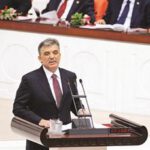President Abdullah Gül vetoes a constitutional amendment allowing early local elections for a second debate in Turkish parliament.
 President Abdullah Gül vetoed a constitutional amendment scheduling local elections five months earlier than usual, yesterday, claiming it would add an additional economic burden to the already suffering economy and that issuing a referendum in the winter would counteract the very purpose of the move—avoiding inclement weather. He claimed the change would have no other benefit than simply rescheduling elections by five months.
President Abdullah Gül vetoed a constitutional amendment scheduling local elections five months earlier than usual, yesterday, claiming it would add an additional economic burden to the already suffering economy and that issuing a referendum in the winter would counteract the very purpose of the move—avoiding inclement weather. He claimed the change would have no other benefit than simply rescheduling elections by five months.
Gül’s veto came nearly 24 hours after the presidency was notified that Parliament approved the constitutional amendment expediting local elections by five months — moving them from Mar. 30, 2014 to Oct. 27, 2013. However, the measure was eight votes short of the required 367 votes needed for a two-thirds majority and necessitated a referendum for its adoption.
The president’s veto was based on three factors. The first stemmed from the amendment’s attempt to protect pre-election campaigns from harsh winter conditions. If the amendment is approved, the necessary referendum will be issued in the winter months, the president said.
“This will contradict with the purpose of the change as winter conditions will negatively affect the referendum works and the people’s participation to it.”
The second reason Gül mentioned was the additional economic burden the referendum would place on the country and the people. He also emphasized that the amendment had no other benefit than to expedite the elections by five months.
Eyes on the Parliament
After Gül’s veto, all eyes have now turned to the government and opposition parties.
The ruling Justice and Development Party (AKP) supports holding local elections earlier than scheduled, although political parties in Parliament could not reach an agreement on a specific date.
“What is important for us is [for the amendment] to come to fruition, not imposing a specific date. Local elections should be held in fall, taking seasonal conditions into consideration. Otherwise, it is meaningless [for opposition parties] to break their promises by saying ‘the AK Party has a hidden agenda’ regarding early local elections. This is shortsightedness and escaping [from elections],” AKP deputy parliamentary group chairman Mustafa Elitaş told reporters in Parliament yesterday.
Speaking at his party’s parliamentary group meeting, Nationalist Movement Party (MHP) leader Devlet Bahçeli said his party will respect President Gül’s decision on the constitutional amendment allowing early local elections, despite his party’s disagreement with holding a referendum.
Bahçeli, meanwhile, blamed the main opposition Republican People’s Party (CHP) for playing a political game by disrupting an agreement over the issue. CHP leader Kemal Kılıçdaroğlu said the people’s choice must be respected if the results at the parliament necessitated a referendum.
“We have to trust people’s will. We should not avoid asking people’s decision,” Kılıçdaroğlu told reporters on Monday when asked whether they would favor holding a referendum for early local elections.
Speaking yesterday in Parliament, Kılıçdaroğlu said that they will not propose any date for earlier elections if Gül returns the constitutional amendment. When asked if they support the date of Nov. 3, 2013 for early local elections, Kılıçdaroğlu said, “We would discuss it if they come to us.”
Elitaş said that the date for local elections is subject to change, stressing that their main objective is to bring local elections forward to a date more convenient for election campaigns. “It might be Oct. 27, Nov. 3 or Nov. 17. However, Nov. 10 is inappropriate I think,” Elitaş said, referring to the fact that Nov. 10 is the memorial day for Mustafa Kemal Atatürk, founder of the Turkish Republic.
(Hürriyet Daily News)















